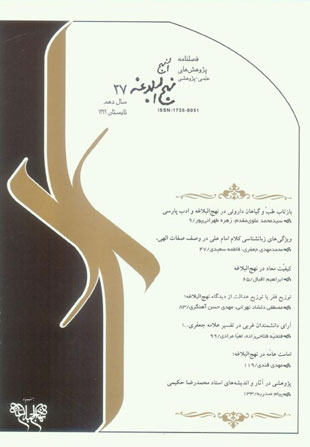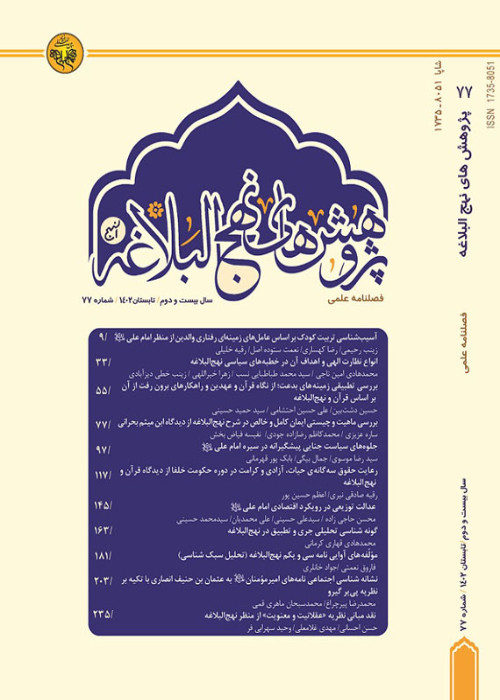فهرست مطالب

نشریه پژوهش های نهج البلاغه
سال دوازدهم شماره 2 (پیاپی 37، تابستان 1392)
- 172 صفحه، بهای روی جلد: 60,000ريال
- تاریخ انتشار: 1392/05/15
- تعداد عناوین: 8
-
-
صفحه 5
-
صفحه 65
-
صفحه 119
-
Page 9
In addition to historical, ethical, theological, philosophical, economical, political, managerial, military, sociological, etc., Nahj al-Balagha has alluded to medicine, treatment, and hygienic criteria too. The present essay deals with essentials of medicine and hygiene in Nahj al-Balagha as well as Persian literature in order to clarify that results of thoughts and efforts of doctors pending centuries has been in agreement with them and medical experiments of scientists and doctors have no status higher than them. Along with Arabic literature from the very beginning, Imam Ali’s precious words has notably influenced Persian literature and Farsispeaking poets too much, and majority of literary men have benefited from those words for making their words and works more attractive and pleasant. The present essay deals with Imam Ali’s medical references to health, bodily diseases, and herbs first; compares them with modern medical methods secondly, and presents some evidence from great Farsi-speaking poets finally.
Keywords: Nahj al Balagha, pain, cure, medicine, herbs, Persian literature -
Page 47To survey linguistic characteristics of Imam Ali’s speech in Nahj al- Balagha is among significant discussions which make addresses familiar with contents of Imam’s speech as well as his methods of speaking. Among clear manifestations in Imam’s speech are his descriptions of the Almighty God presented in his monistic sermons at the highest level of eloquence. From aesthetical point of view, application of eloquent manifestations such as literal embellishments as well as phones and appropriate euphuism on the one hand and precise, sound, and most eloquent contents – such as referring to Quranic verses, denotation, explanation of every subject by using relevant sentences, expounding and correcting beliefs, precise descriptions along with exquisiteness and beauty, explanation of human impotence as to knowledge of depth of divine attributes, and praying – on the other are among linguistic characteristics of Imam Ali’s speech in this connection. In the present essay, the said points in Imam’s speech are taken into consideration as to description of divine attributes in monistic sermons of Nahj al-Balagha.Keywords: Nahj al Balagha, language of Nahj al Balagha, tawhid, divine attributes, manifestations of eloquence
-
Page 65Resurrection is one of the Islamic fundamental teachings which has some relation with other religious fundamental teachings as well as precepts; in other words, with all affairs of man and world. This principle is referred to in several positions in Nahj al-Balagha. Deliberation upon such positions indicates that this principle can be surveyed in Nahj al- Balagha with regard to some aspects including its nature and quality. Imam Ali considers resurrection in the world in the continuity of the first creation and then its full destruction describing its quality as being material. While paralleling man with three states of the world, Imam emphasizes material resurrection.Keywords: resurrection, Nahj al Balagha, the world, man, material, bodily, hereafter, Day of Doom
-
Page 83As those who claim justice have had various foundations for administration of justice throughout history, it seems necessary to clarify what was the foundation of Imam Ali, the real caller for justice, in this connection: Was it distribution of poverty, or production and distribution of wealth? Reviewing goals of ruling from Imam Ali’s perspective as well as the way he looked at politics clarify that Imam Ali’s ultimate goal of ruling was education and training divine men; and justice plays role of a mediator and an appropriate instrument for achieving that goal. In that though, poverty is an undesired term which has destructive effects on both individual and society. On the other hand, Imam’s explicit words specify that what is desired by him for developing justice is production and distribution of wealth. Some administrative methods of the Imam such as gathering unearned properties, supporting useful investors and artisans, cultivation, and taxes make his perspective capable of being modeled.Keywords: wealth, poverty, fai', justice, distribution
-
Page 99
In his commentary on Nahj al-Balagha, Allama Ja’fari has used opinions of western scholars in order to expound Imam Ali’s words and also to compare them with the latter, presenting and evaluating the former’s opinions both directly and indirectly. That evaluation leads sometimes to acceptance and sometimes to rejection of those opinions. In the position of analysis and survey, however, Allama presents positive and negative angles of such thoughts. Keywords:
Keywords: western thinkers, Allama Jafari, survey of opinions, Nahj al Balagha -
Page 119Imama and leading a society as a vital and fundamental subject is frequently mentioned by Imam Ali in both sermons and letters of Nahj al- Balagha. Contents of such sermons and letters can be categorized in two parts of “General Imama” and “Particular Imama.” The present essay is centered on the first topic, i.e., general Imama which includes generalities of Imama and does not focus on the determination of Imam Ali as the objective instance of an Imam whose following is mandatory. Discussions of general Imama are taken into consideration in 40 positions in Nahj al-Balagha dealing with such subjects as the concept of Imama, rights and duties of the Imam, necessary need of society to the Imam, necessary qualities of an Imam whose following is mandatory, the status of explicitly appointment of the Imam, and mutual duties of Imam and umma. Dealing with survey of those subjects in the mirror of Nahj al- Balagha, the present essay clarifies that among three groups of twelver Shiites, Sunnite traditionalists, and Mu’tazila, it is the Shiite perspective which is closest to the teachings of Imam Ali on general Imama.Keywords: general Imama, Nahj al Balagha, necessity of Imam, rights, duties of Imam, qualities of Imam, testament, explicit appointment, umma's duties to the Imam
-
Page 133To seat at the coast of thoughts of a man who just guarded frontiers of the religion and considered himself a servant of the court of Ahl al- Bayt in his whole life is not that easy, but is so pleasant. In the author’s opinion, life, efforts, and thoughts of master Hakimi were devoted to revival of two great truths; he abandoned all this-worldly opportunities and chances in order to become the reviver of these two majestic pillars:1. Detailed knowledge (with all of its branches) on the basis of Thaqalain,2. Educating and training both individuals and government on the basis of Thaqalain.Keywords: the school of separation (tafkik), Thaqalain, knowledge, government, justice, intellect, philosophy, Mohammadreza Hakimi, al, Hayat


